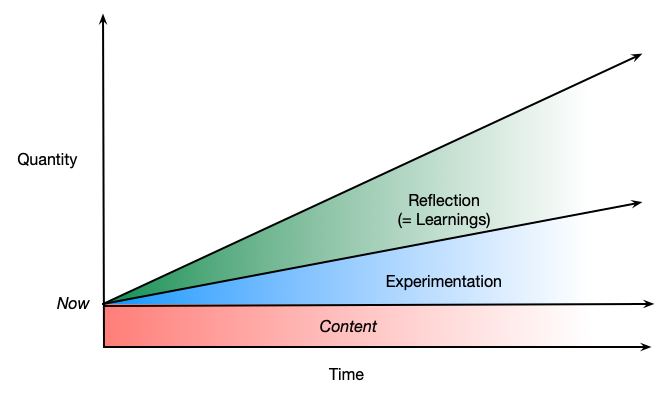At the recent LearnTec conference, I was on a panel with my ITA colleagues, Jane Hart, Harold Jarche, and Charles Jennings. We were talking about how to lift the game of Modern Workplace Learning, and each had staked out a position, from human performance consulting to social/informal. Mine (of course :) was at the far end, innovation. Jane talked about how you had to walk the walk: working out loud, personal learning, coaching, etc. It triggered a thought for me about innovating, and that meant experimentation. And it also occurred to me that it led to learning as well, and drove you to find new content. Of course I diagrammed the relationship in a quick sketch. I’ve re-rendered it here to talk about how learning from experimentation is also a critical component of workplace learning.
 The starting point is experimentation. I put in ‘now’, because that’s of course when you start. Experimentation means deciding to try new things, but not just any things. They should be things that would have a likelihood of improving outcomes if they work. The goal is ‘smart’ experiments, ones that are appropriate for the audience, build upon existing work, and are buttressed by principle. They may or may not be things that have worked elsewhere, but if so, they should have good outcomes (or, more unlikely, didn’t but have a environmentally-sound reason to work for you).
The starting point is experimentation. I put in ‘now’, because that’s of course when you start. Experimentation means deciding to try new things, but not just any things. They should be things that would have a likelihood of improving outcomes if they work. The goal is ‘smart’ experiments, ones that are appropriate for the audience, build upon existing work, and are buttressed by principle. They may or may not be things that have worked elsewhere, but if so, they should have good outcomes (or, more unlikely, didn’t but have a environmentally-sound reason to work for you).
Failure has to be ok. Some experiments should not work. In fact, a failure rate above zero is important, perhaps as much as 60%! If you can’t fail, you’re not really experimenting, and the psychological safety isn’t there along with the accountability. You learn from failures as well as from successes, so it’s important to expect them. In fact, celebrate the lesson learned, regardless of success!
The reflections from this experimentation take some thought as well. You should have designed the experiments to answer a question, and the experimental design should have been appropriate (an A-B study, or comparing to baseline, or…). Thus, the lesson extracted from learning from experimentation is quickly discerned. You also need to have time to extract the lesson! The learnings here move the organization forward. Experimentation is the bedrock of a learning organization, if you consolidate the learnings. One of the key elements of Jane’s point, and others, was that you need to develop this practice of experimentation for your team. Then, when understood and underway, you can start expanding. First with willing (ideally, eager) partners, and then more broadly.
Not wanting to minimize, nor overly emphasize, the role of ‘content’, I put it in as well. The point is that in doing the experimentation, you’re likely to be driven to do some research. It could be papers, articles, blog posts, videos, podcasts, webinars, what have you. Your circumstances and interests and… who knows, maybe even courses! It includes social interactions as well. The point is that it’s part of the learning.
What’s not in the diagram, but is important, is sharing the learnings. First, of course, is sharing within the organization. You may have a community of practice or a mailing list that is appropriate. That builds the culture. After that, there’s beyond the org. If they’re proprietary, naturally you can’t. However, consider sharing an anonymized version in a local chapter meeting and/or if it’s significant enough or you get good enough feedback, go out to the field. Present at a conference, for instance!
Experimentation is critical to innovation. And innovation takes a learning organization. This includes a culture where mistakes are expected, there’s time for reflection, practices for experimentation are developed, and more. Yet the benefits to create an agile organization are essential. Experimentation needs to be part of your toolkit. So get to it!
Clark,
Wisdom as usual.
Would love to hear your take on my former academic pursuit and the role that simulation can play in advancing the learner along the continuum from novice to SME.
Jay, not sure I know your former academic pursuit ;), but simulations are powerful environments for experimentation, and therefore learning. Driven by models, they allow infinite replay. Though we know that just pure experimentation in an open environment actually doesn’t work well, and guided learning is the go. Hence my transition from simulation > scenario > game. E.g. putting in goals and initial conditions, and tuning. Thanks for playing!